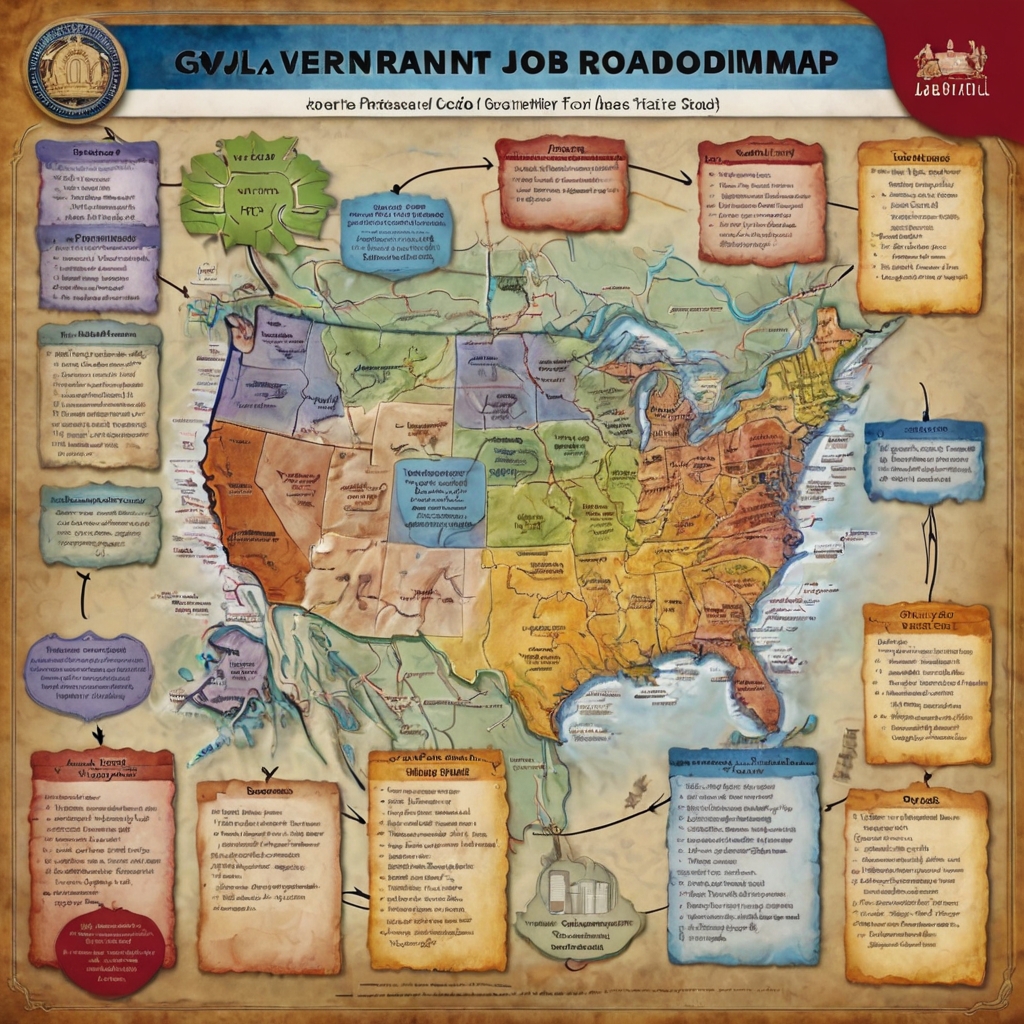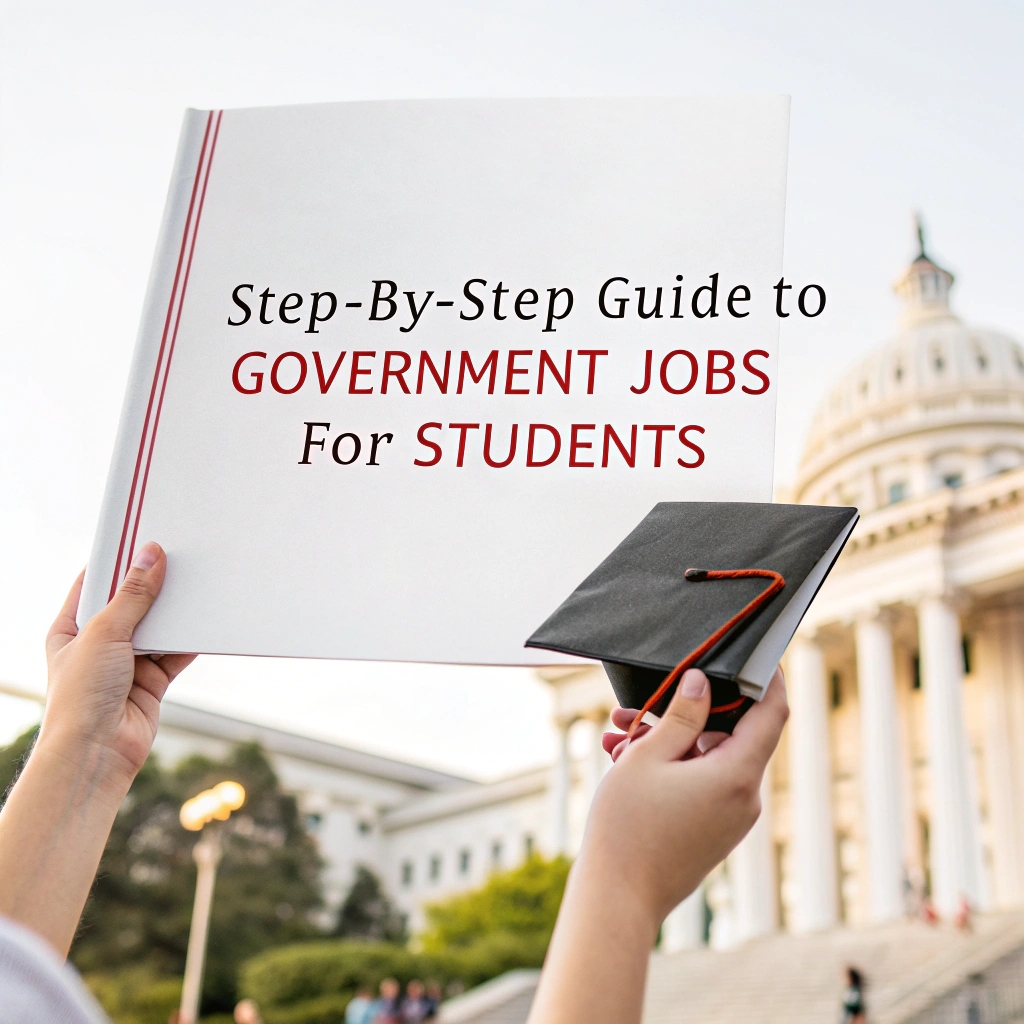Are you feeling lost in the sea of government job opportunities? Do you know where to start your journey?
As a student, navigating the world of government jobs can be overwhelming.
But what if I told you that with this simple step-by-step guide, you’ll have a clear roadmap to creating a fulfilling career as soon as possible!
We’ll dive into practical strategies for identifying your strengths and interests.
Identifying Your Job Values
When it comes to creating a government job roadmap, identifying your own values can make all the difference. It may seem simple yet in reality it can be very difficult for many people as there are so many options and requirements.
Your goals are likely tied up with your core values – what matters most to you when pursuing a career in public service? Is it making a positive impact, working with diverse groups of people or having more control over decision-making?
It may help to think about the type of work that will satisfy those desires. Does this job involve hands-on tasks like providing services, overseeing projects and managing budgets? Or does your ideal role offer you opportunities for policy development and legislation.
Exploring Career Options with AI Tools
Unlock your potential for success in government careers by leveraging AI tools. A well-planned strategy can help you navigate the complexities and find your dream job.
Government agencies are harnessing AI to revolutionize various sectors, such as healthcare, where predictive analytics improve patient outcomes, or transportation, where intelligent traffic management systems optimize road safety. The City of New York is a great example of this – their AI-powered system reduces congestion during rush hour by up to 30%.
To make the most of these opportunities, consider your skills and experience:
- How can you apply data analysis expertise in government jobs?
- What role can policy development play in AI-driven decision-making?
Popular tools used by government agencies include:
- Data analytics software: Optimize public services with platforms like Tableau or Power BI. For instance, the National Institutes of Health uses these tools to analyze patient outcomes and improve treatment plans.
- Cybersecurity solutions: Protect sensitive information from cyber threats with solutions like IBM Security or Palo Alto Networks.
Think of an AI roadmap as your personal guide to navigating the world of government jobs.
It’s not about being an expert in AI technology, but about understanding how to use these tools effectively. For example, consider this:
- Research popular tools and identify key skills for roles like data analyst, artificial intelligence specialist, or cybersecurity officer.
- Develop your expertise by applying current knowledge and experience to transition into these fields.
Ready to explore the world of government jobs using AI? Here’s a 5-step guide:
- Research popular tools: Explore platforms like Google Cloud AI Platform or Microsoft Azure Machine Learning.
- Identify key skills: Look at job descriptions and requirements for roles in healthcare, transportation, or education.
- Develop your expertise: Apply current knowledge and experience to transition into these fields.
The National Institutes of Health employs data analysts with machine learning expertise to improve patient outcomes, while the City of New York uses AI-powered traffic management systems to reduce congestion during rush hour. By applying current skills and experience, students can transition into these fields more easily.
Government agencies are harnessing AI in education by creating personalized learning platforms that use machine learning to tailor instruction to individual students’ needs.
For instance:
- The US Department of Education uses data analytics software like IBM Watson to improve student outcomes.
- Some private institutions partner with government agencies using AI-powered solutions for educational resources, making it easier for students to access quality information.
By following these steps and exploring popular tools, you’ll be better equipped to create a personalized roadmap that aligns with your goals and interests.
Finding Relevant Education and Skills

Identify your core strengths and values to create a personalized government job roadmap.
Discover how to narrow down potential career paths by exploring areas of interest. Research government jobs in fields related to topics that inspire you most, such as environmental conservation or wildlife management. Utilize online resources like USAJOBS, O*NET Online, and GovernmentJobs.com to find relevant job postings and salary ranges. This will help you envision a career that integrates your passion with professional fulfillment.
Consider the following examples of government agencies focused on these areas:
- US Fish and Wildlife Service
- Environmental Protection Agency (EPA)
- National Park Service
Create a list of activities where you shine, as well as situations or environments where you feel most comfortable and fulfilled. Assess the skills necessary for various jobs within public service by examining job descriptions, educational requirements, and online resources like LinkedIn Learning (formerly Lynda.com) or Coursera courses.
For example:
- Review federal government job postings that require technical proficiency in programming languages like Java or Python.
- Research programs offered through the National Science Foundation’s Graduate Fellowship Program to support graduate studies in STEM fields.
Assessing your skills and interests will allow you to identify areas needing improvement so a path forward becomes possible.
To create a comprehensive understanding of how to find the right balance between education and personal passions, consider:
- Developing a skills inventory using tools like Excel or Trello.
- Creating a personal brand statement highlighting transferable skills and experiences.
- Exploring online communities like Reddit’s r/career advice or r/government jobs for guidance and support.
By taking these steps, you can unlock the key to finding employment that is meaningful. Remember to be patient and persistent in your job search, as it may take time to find a career path that perfectly aligns with your interests and skills.
Building a Strong Professional Network
In order to achieve your career goals in government, building a robust professional network is essential. A strong network of contacts can open doors, provide valuable insights into industry trends and help you land your dream job.
To start, clearly define what you want from your future job with the government. This includes identifying specific roles or sectors that align with your skills and interests. For example, do you aspire to work in policy-making? Law enforcement? Or public administration? Be as specific as possible this will help guide your search for job opportunities.
Identifying transferable skills is also crucial. These are skills that have been developed through previous experiences or coursework and can be applied in a government setting. Consider volunteering for internships, taking courses in law, politics, or public policy to bolster your resume.
Some examples of valuable transferable skills include:
- Communication: Can you articulate complex ideas with clarity and precision?
- Problem-solving: How do you approach challenging problems in the workplace?
- Project management: Have you successfully managed multiple projects simultaneously?
Networking within the government sector can provide invaluable insights into job requirements and current trends. Researching and connecting with professionals working in relevant roles will help you gauge what employers are looking for when hiring.
To find your way to these professionals, try attending regional government job fairs or joining online forums focused on public administration. You might also consider reaching out to individuals who have successfully navigated the industry through personalized emails or LinkedIn messages.
Continuous learning is a roadmap for your public sector career. Pursue courses, certifications, or training programs offered by government agencies such as the National Association of Government Executives (AGE) to stay up-to-date with industry developments and network with peers who are making headlines in their fields.
To boost job prospects, consider enrolling in online courses that focus on emerging trends like data analytics for public administrators. This will give you a competitive edge when applying for government jobs or internships.
Here’s an example of what one such course might look like:
- The National Defense University’s (NDU) Cybersecurity Certificate Program
- Harvard University’s Executive Leadership in Government Certification Program
Stay adaptable and be prepared to pivot your strategy as needed. By doing so, you’ll not only find success but also gain valuable insights that can help others achieve their public sector career goals.
By taking control of your professional development, building a network of contacts within the government sector will become second nature.
- Stay attuned to industry developments through reputable news sources and blogs.
- Leverage your connections for mentorship opportunities or job leads.
Tailoring your resume to specific jobs
To get started on your journey, begin by researching various government jobs within agencies that interest you most. You can find information about these roles through official government websites or job boards like USAJOBS.
When exploring potential careers, consider the diverse range of opportunities available in federal agencies such as HUD (Housing and Urban Development) for urban planning or DOT (Department of Transportation) for data analysis. Some examples include:
To effectively tailor your resume to government jobs, review the key qualifications and requirements for each role you’re interested in. This will help you identify relevant skills and education that align with job demands.
Here are some ways to strengthen your application:
- For example, if a job posting requires experience with GIS (Geographic Information Systems), highlight at least two projects showcasing your expertise, including:
- Project name
- Description (250-word maximum)
- How it contributed to solving real-world problems and notable achievements or results
By tailoring your resume to specific government jobs, you’ll increase your chances of standing out in a competitive job market. Remember to also showcase relevant coursework, internships, or volunteer work that demonstrate your skills and qualifications.
When searching for potential positions on official government websites like USAJOBS or Federal Jobs, consider the following:
- Salary ranges: Look up salary ranges for specific jobs within federal agencies to determine whether you’re in a competitive range.
- Average candidate pool size: Review information about the average number of candidates applying for each position to gauge competitiveness and adjust your strategy accordingly.
- Required skills and education: Tailor your resume with relevant sections highlighting your education, skills, or experience that aligns with job requirements.
By taking these steps, you can create a personalized job roadmap within government agencies and increase your chances of success in the competitive federal job market.
Crafting Effective Personal Statements

According to USAJOBS data, a well-crafted personal statement can be your key to landing that coveted government job interview. Over 100 applicants vie for just three spots but with a compelling narrative, you could outshine the rest.
When developing an effective government job personal statement, start by identifying specific themes: Your academic background provides a strong foundation; relevant courses or certifications showcase expertise; leadership roles demonstrate initiative and teamwork. Be honest about your strengths and areas for growth to create a genuine voice in your writing.
For instance, if you’ve collaborated with diverse groups through community service projects, highlight this aspect of your statement. Emphasize what you learned from these experiences: What skills did you develop? How have they helped shape who you are today?
Showcase specific examples that demonstrate leadership and initiative. Describe a time when you successfully mediated a conflict in your school’s debate team or led a community event. Highlighting these achievements will help illustrate your problem-solving skills, communication abilities, and ability to work effectively under pressure.
Tailor the tone of your personal statement to resonate with government hiring officials. Use language that is concise yet engaging, highlighting key skills or accomplishments instead of general responsibilities (“I was responsible for organizing an event”). For example, say “Coordinated a successful fundraising campaign in my school’s annual charity drive,” which resulted in $X amount collected.
By focusing on showcasing relevant experiences and skills while adapting to the tone expected by government hiring officials, you’ll create an effective personal statement that showcases your potential as a candidate for government jobs.
Preparing for Interviews with Confidence
Creating a personalized government job roadmap requires careful planning. In this guide, we’ll show you how to break down the process into manageable steps and increase your chances of success.
Let’s start by identifying your career goals. This is often the most crucial step in preparing for government jobs. It helps you focus on what kind of role you’re aiming for within government and what specific responsibilities come with it.
Consider researching job descriptions, talking to current or former government employees, and even browsing through job postings online to get a better understanding of your desired field. For example, if the goal is a position in policy development, identifying key stakeholders who would be involved in decision-making processes can give you valuable insights into how policies are made.
Next: Developing Skills You Need
Developing the right skills will also play an essential role in landing government jobs. This includes things such as analyzing complex policies, negotiating with various parties and showing effective leadership.
For instance, taking courses or workshops to develop your analytical and problem-solving abilities can help prepare you for situations that require breaking down difficult information into understandable components.
Let’s look at a real example: Data Analysis is an important skill for any government job. Not only do data analysis skills improve the ability to identify trends and make predictions but they also aid in decision-making by using different statistics to support your arguments.
In addition, it will give you confidence when communicating with colleagues or superiors about sensitive issues.
Finally Tailoring Your Application Materials
The application process for government jobs can be quite competitive. That’s why having a solid resume and cover letter that highlight relevant experience and skills learned while working in government or public service is crucial.
Here are some concrete tips to create your own example of policy briefs, which will help you showcase your ability to communicate complex ideas.
To further boost your chances of landing the job, try tailoring each section of a resume for specific applications. Tailor every relevant piece of information on both sides in order to stand out from other applicants.
By breaking down the process into manageable steps and staying focused, crafting your path to landing government jobs is within reach.
Navigating Government Job Websites Effectively

Navigating government job websites can be overwhelming due to numerous websites and countless applications. Follow this step-by-step guide to streamline your search process.
Identify your target government job
Researching various agencies within the federal government, such as USAJOBS or other federal agency websites, is key to finding a clear focus on your goals. This helps you pinpoint relevant job opportunities and avoid wasting time searching for roles that aren’t a good fit.
- Example:
- Agency A (Department of Education) has career opportunities in curriculum development and educational research.
- Agency B (Federal Bureau of Investigation) offers openings for analysts and investigators.
Utilize keyword filtering
Most job boards have search functions that allow you to filter by keywords like job title, location, and level of experience required. To get the most out of these tools:
- Filter by job title: project coordinator
- Use specific terms related to your desired role, such as:
- Project management software (e.g., “Asana” or “Trello”)
- Data analysis techniques (e.g., “SQL” or “Python programming”)
- Filter by location: Washington D.C.
- Filter by level of experience: entry-level
Develop a strong understanding of Federal Resume Guidelines
Familiarize yourself with the key sections to include in your resume, such as:
- Summary
- Education & Work Experience
- Skills
Additionally, focus on using essential keywords that set you apart from other applicants. This can be achieved by:
Tailoring your Summary section to highlight transferable skills and achievements.
Using action verbs like “managed” and “created” to describe work experience.
By following this structured approach, you can maximize the effectiveness of your government job search, significantly reducing frustration and finding meaningful employment with ease.
Busting Common Interview Questions with AI Assistance
Government jobs in highly competitive markets present unique challenges. To succeed, you need a solid approach.
To excel in a government job interview, focus on understanding the organization’s needs and how you can address them.
Deeply researching your target organization involves not only learning their mission and goals but also identifying areas where they struggle, such as budget constraints or outdated policies. This will help you develop targeted solutions that showcase your problem-solving skills.
Government job interviews often focus on your ability to work within strict regulations, think critically, and handle multiple priorities. By preparing thoughtful answers to common interview questions like “How would you handle conflicting priorities?” or “What do you know about our agency’s mission?”, you’ll be better equipped to demonstrate these skills.
By harnessing technology, you can streamline your interview prep with tools like interview simulators that provide real-time feedback on your responses. This will help refine your answers to potential questions, allowing you to deliver more concise yet informative responses.
According to recent studies, candidates who combine thorough research with tech-enhanced preparation have seen significant improvements in interview performance. By taking this approach, you can stand out from the competition and secure a government job that aligns with your passions.
Narrowing Down Your Options: The Key to Success in Government Job Hunting
Using online resources and forums can provide valuable insights into what employers are looking for in a candidate. Utilizing these platforms allows you to tap into the experiences of others, gain practical advice, and stay informed about industry trends.
The job market is constantly evolving, with new challenges and opportunities arising every day. By leveraging online resources and forums, individuals can develop a deeper understanding of their desired career path and make more informed decisions. This information is essential in helping you tailor your resume, cover letter, and interview skills to meet the needs of potential employers.
By taking action today to seek out valuable insights from others, candidates can gain a competitive edge in their job search. With the right guidance, they can navigate the complexities of government job hunting with confidence and increase their chances of landing an ideal position. Don’t miss this opportunity – start exploring online resources and forums now!
